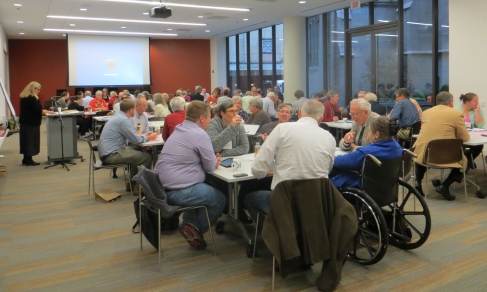I’m back home now from the Covenant Network of Presbyterians‘ Marriage Matters conference. My bags are unpacked, the stacked mail will be sorted through tonight (junk mail, junk mail, junk mail, rejection letter, junk mail, bill, junk mail…), and most, not all, of the phone messages and email replies have been taken care of. Now I have time to tell a bit about the conference.
This trip was done on the extreme cheap. I was very blessed and grateful to receive scholarship money to pay for the event, and the church agreed to pick up the travel and lodging expenses. Still, in order to be as frugal with the church’s money as possible, I didn’t stay at the official conference hotels, or even an “unofficial” hotel, for that matter. Instead, I decided to be a bit more adventurous – I booked space at the Wrigley Hostel, a literal stone’s throw from Wrigley Field, offering a great price and almost door-to-door transportation via the Red Line between it and the conference downtown at the Gratz Center of the Fourth Presbyterian Church.
I got into town Wednesday evening, before the conference and pre-conference workshop kicked off the next morning – which, while I’m thinking about it, why was it called a “pre-conference” workshop? Why wasn’t it just considered part of the conference? I didn’t get that, but just like the question of why men have nipples and other similar imponderables, I guess there are apparently some things you just go with.
The hostel was pretty much as advertised online – basic, no-frills dormitory-style lodging with some common areas for socializing, with a very diverse group of mostly (much) younger, mostly international travelers passing through. That combination of youth and international flavor would have made the stay interesting enough; add to that the fact that I was staying there over Halloween and it was all the more interesting. Overall, I have no problem with spartan accommodations when traveling on the cheap, and I didn’t here. I will say, though, that being assigned to an upper bunk in the room gave me regular reminders that I’m not 25 any more. Oy.
I crawled down out of my upper berth early Thursday morning, trying to get ready without waking up the others in the room. I grabbed some toast and a piece of fruit in the kitchen – literally just outside my bedroom door; I had to walk through it to get to the room – and headed to the Addison stop on the Red Line, where a very nice transit employee walked me through buying a three-day metro pass.
When I left the hostel, the skies were grey but dry. I have a history of leaving a trail of forgotten umbrellas behind me when traveling, so I decided to leave my current one back in the room – probably the worst decision I made all day. It was pouring when I exited the Chicago & State stop, and even though it was just a short walk to the Gratz Center, I was pretty well soaked through by the time I got to there. My saturated wool sweater made me smell like a wet sheep, so I peeled it off and hung it over a chair to dry. At the same time, this first day of the conference there were problems keeping the temperature in the building to levels anywhere this side of hell, which quickly made a mockery of the claims made on the label of my deodorant. Before long, I was wishing I only smelled as bad as a wet sheep. I feel for anyone who had to sit next to me this first day.
Weather and climate control issues aside, I quickly registered for the conference and crawled into a cup of hot coffee. As I did, I got the opportunity to meet Brian Ellison, the Executive Director of Covenant Network, with whom I’d previously communicated via email but had never met in person. It was great to finally meet him.
The workshop scheduled for this morning was led by Kimberly Bracken Long, an associate professor of worship at Columbia Theological Seminary. The primary focus of the workshop was to consider the issue of developing a marriage liturgy that would be universally appropriate regardless of the sexes of the two partners. In doing so, we looked at the current PC(USA) liturgy. We also reviewed same-sex or universal marriage or blessing liturgies coming out of the Evangelical Lutheran Church of America, the Episcopal Church of America, and the United Church of Canada (the largest Protestant denomination in Canada; a melding of most of the formerly separate Methodists, Presbyterians, Congregationalists, Brethren, and others). The table I was part of looked specifically at the UCC liturgy, and I was actually very impressed with most of it.
In the afternoon, we heard the first of plenary session speakers, Macky Alston. Alston comes from a long line of Presbyterian ministers – in fact, his father, in addition to being a pioneer for civil rights in the 1960’s, was the Moderator of the Presbyterian Church of the United States (our official title for the Grand Exalted Poobah of the denomination). Among other things, Alston is a documentary filmmaker; his recent documentary “Love Free or Die,” about Episcopal bishop Gene Robinson, won the 2012 Sundance Film Festival Special Jury Prize. Alston offered a very moving, sometimes gut-wrenching, sometimes inspiring glimpse into his own life as a gay man growing up in a church which largely shunned him. Challenging those gathered there, he summarized the findings of focus-group studies that he’d conducted regarding people’s opinions on matters of LGBTQ equality in church and society. He pointed out that while there were certainly compelling scriptural arguments for inclusivity, too often, progressive Christians didn’t make them – opting instead for more secular, non-faith-based appeals, thinking that these arguments would appeal to a broader swath of the public. At the same time, opponents of inclusivity within the church consistently used scriptural arguments. That means that when the public, largely consisting of the great Christian “middle ground” – those non-extremists who are trying to honestly reach some thoughtful opinion about LGBTQ inclusivity that was consistent with their faith – heard the arguments, the only scriptural arguments they’ve heard were for from the opponents to inclusivity – so they thought that the opponents’ arguments were the only “Christian” position possible. In short, in their attempts to make the progressive Christian position more accessible and acceptable by making it more secular, they actually made it less so. Alston argued for progressives to change course, to make their arguments from scripture – but not in a dry, academic sense. At the Thanksgiving dinner table, don’t make Cousin Sue’s eyes glaze over by discussing the finer points of koine Greek. Simply make the argument for love and justice, from a scriptural basis. This, along with people’s direct personal interaction with LGBTQ folk, are what have consistently proven to change people’s long-held thoughts.
Of course, Alston said much more than that, and much more eloquently. It was a great kickoff session.
As I was exiting the Buchanan Chapel, I bumped into Matthew Vines and introduced myself. Vines is a gay man who grew up in a conservative, Evangelical, Presbyterian church in Wichita, Kansas, who made media waves about a year ago when he posted an hour-long youTube video detailing his personal research into what the Bible says – and doesn’t say – about homosexuality. He was scheduled to lead one of the workshops available at the conference. I ended up attending his workshop on Friday and speaking with him informally a few times during the conference. His presentation in the original video is quite remarkable (he certainly isn’t the first to make the arguments he makes in the video, but he presents the information very effectively and passionately; I’ve recommended it to a number of people over the past year), and he’s even more impressive in person. Since creating the original video, he’s started an organization called The Reformation Project – but more about that in a follow-up blog entry.
After a delicious jambalaya dinner, evening worship included a message from Frank Yamada, President of McCormick Theological Seminary. His message was based on Genesis 2 – the second creation account, detailing the creation of man and woman; one of the texts often held up as an argument against same-sex relationships and marriage. Yamada offered the view – effectively, I thought – that the primary point of this text is not really about gender-specifics, but rather, that human isolation and loneliness is not good; that it is a good thing for us to form relationships with another whom we find to be an appropriate companion, regardless of whether that companion is of the same or the opposite sex (Yamada didn’t specifically mention it, but I always note when reading this text that God didn’t create a woman for the man and order the man to accept her as his companion – rather, God created the woman and left it for the particular man to choose whether this was a suitable companion for him. To repeat: God left it to the human being himself to determine who would be his appropriate companion/helper). Yamada stressed that being isolated and alone was, to quote God, “not good” – and that accepting only such relationships that are between two people of the opposite sex, and refusing to accept such relationships between those of the same sex, is actually working contrary to God’s will. He added to this point by referring to Galatians 3, that in Christ there is no longer Jew nor Greek, slave nor free, male and female – that these are meaningless distinctions in the eyes of God. It was a very good sermon.
After this, I headed back north on the Red Line and to the controlled mayhem of the hostel. And there was morning, and there was evening, the first day. More to come.

